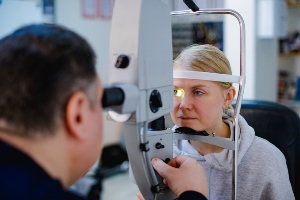Blog
Eye Surgery Medical Malpractice: What Victims Need to Know
Posted on behalf of Peter T. Nicholl in Medical Malpractice Published on August 30, 2024 and updated on September 10, 2024.Eye surgery can be a nerve-wracking experience. The last thing any patient wants is a mistake that could jeopardize their vision.
Our Maryland medical malpractice lawyers have devoted more than 30 years to advocating for medical malpractice victims and recovering millions in compensation.
Table of Contents
- What Are Some Examples of Medical Malpractice During Eye Surgery?
- What Are Potential Injuries From Eye Surgery-Related Medical Malpractice?
- What Type of Compensation May I Receive for Eye Surgery Medical Malpractice?
- How Can Your Lawyer Prove That Eye Surgery Malpractice Occurred?
- Did You Suffer Eye Surgery Medical Malpractice? Call The Law Offices of Peter T. Nicholl
If you have experienced eye injuries during surgery, and you think they were a result of eye surgery malpractice, our lawyers may be able to help you. We offer a free consultation and only charge fees if we win your case.
Call us to learn more about your legal options: 410-297-0271.
What Are Some Examples of Medical Malpractice During Eye Surgery?

There are many examples of medical malpractice that could happen before, during or after surgery, such as:
- Performing surgery on the wrong eye
- Implanting the wrong intraocular lens during cataract surgery
- Failure to review your medical history to determine if surgery is safe or whether any of your medications could cause problems during surgery
- Administering anesthesia improperly
- Using unsanitary tools or equipment, raising the risk of infection
- Damaging the surrounding tissues at the surgical site
- Failure to obtain informed consent from the patient
- Leaving surgical instruments inside the patient
- Failing to diagnose post-surgical issues/complications
- Misdiagnosis or failure to diagnose eye conditions
- Medication errors after surgery
These various examples of eye surgery malpractice could be caused by:
- Inadequate training
- Inadequate staffing
- Clerical errors
- Miscommunication
- Failure to obtain an accurate medical history
What Are Potential Injuries From Eye Surgery-Related Medical Malpractice?
Victims of eye surgery malpractice can experience numerous injuries, including:
- Partial or total vision loss
- Persistent pain or discomfort in the eye
- Double vision or impaired depth perception
- Photophobia: an uncomfortable sensitivity to light
- Infection
- Retinal detachment: a serious condition where the retina separates from its support tissue
- Corneal scarring: When the eye’s clear, dome-shaped surface is damaged and scar tissue forms
- Over- or under-correction, resulting in unclear vision
- Bleeding, during or after eye surgeries, such as cataract surgery
- Blindness
- Loss of an eye: Severe complications or infections may sometimes necessitate eye removal
What Type of Compensation May I Receive for Eye Surgery Medical Malpractice?
If your lawyer can establish that the doctors who treated you breached the standard of care, and it caused your injuries, you may be eligible to recover various forms of compensation:
- Medical Expenses: This includes costs for the initial surgery, any corrective procedures, ongoing treatments, medications, and future medical care related to the malpractice.
- Lost Wages: You can file a claim for lost wages if you miss work during your recovery.
- Loss of Earning Capacity: If you suffer partial or complete loss of vision, and this prevents you from working in the same capacity as before, you may be eligible to seek compensation for lost earning capacity.
- Pain and Suffering: Victims may seek compensation for injuries that cause physical pain and emotional distress. However, Maryland has a cap on non-economic damages.
- Loss of Enjoyment of Life: If the injury has significantly impacted your quality of life, you may be able to include this in your claim.
- Punitive Damages: In cases of gross negligence, you might be awarded punitive damages to punish the healthcare provider and deter similar conduct in the future.
Victims should consult an experienced lawyer to determine the value of their potential case. They can provide guidance tailored to your situation and help you navigate the legal process.
How Can Your Lawyer Prove That Eye Surgery Malpractice Occurred?
Even if it is clear and obvious that a medical professional performing your surgery made a mistake that impacted your vision, this alone does not prove medical malpractice.
You must prove your injuries were caused by a breach of the standard of care. This means doctors failed to perform as other similarly situated medical professionals would have if they were in a similar situation.
For example, maybe doctors should not have done eye surgery because of your preexisting medical issues. If your lawyer can prove other similarly situated medical professionals would not have done surgery, there may be a case.
Your lawyer needs to do a comprehensive investigation and consult medical experts to determine if there was a deviation from the standard of care.
Your lawyer must also prove your injuries are a direct result of the deviation from the standard of care. In other words, your injuries would not have occurred without the breach of the standard of care.
Did You Suffer Eye Surgery Medical Malpractice? Call The Law Offices of Peter T. Nicholl
If your life has been impacted by eye surgery malpractice, you should consider seeking legal support from an experienced lawyer.
With decades of experience and a commitment to justice, attorneys at The Law Offices of Peter T. Nicholl work tirelessly to seek the compensation victims deserve. We understand the challenges you are facing and are here to help, without any fees unless we win.
We are available 24/7 to answer your questions, and your initial consultation is free.
Learn more about your legal rights by calling today: 410-297-0271.

